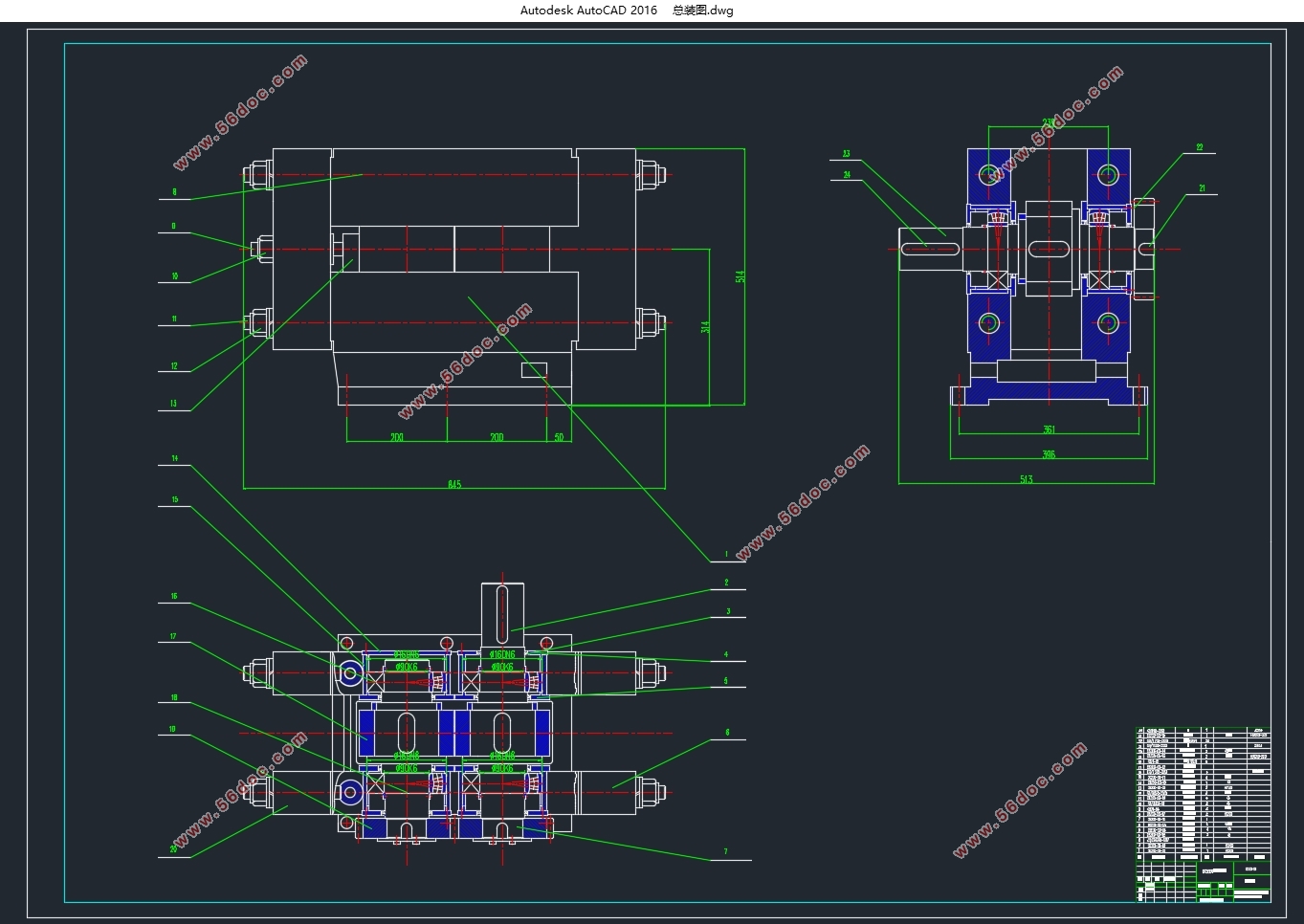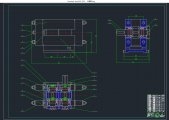DG200型造粒机设计(含CAD零件图装配图)(任务书,开题报告,论文说明书10000字,CAD图7张)
摘要
本文内容主要是DG200型造粒机的设计计算。首先第一部分讲的是粉体技术,介绍了粉体的定义,几何性质及要设计造粒设备的经济评价。然后介绍了四种粉体造粒技术,每种类型列出典型的设备。最后是对DG200型造粒机进行设计计算。
该型造粒机是干法造粒机械,使用粉体物料进行造粒。工作原理是用喂料机构将物料喂料进入轧辊造粒区域,两轧辊之间轧辊力将物料压实,再由轧辊上穴孔的形状来制成所需颗粒形状。对此造粒机的设计主要部分有对辊造粒机造粒主体,以及传动系统。
此型号造粒机的传动设计:选用恰当的电机作为动力,经带轮、减速器等零件构成的传动机构将动力和速度传递给轧辊。通过了解物料性能,实验得到轧辊力大小及载荷类型,然后经过设计计算得到零部件的结构参数,并根据参数选取标准件,最后校核这些零部件是否满足设计要求。
关键词:粉体造粒 粉体物料 轧辊力 对辊造粒机 强制喂料
DG200 Granulator design
Abstract
The content of this paper is mainly about DG200 granulator design and calculation. First, the first part of the powder technology is introduced, introduced the definition of powder, geometric properties and to design the economic evaluation of granulation equipment. And then introduced four powder granulation techniques, each of which lists typical equipment. Finally, the DG200 granulator is designed and calculated.
The granulator is a dry granulation machine, using powder material for granulation. The working principle is to use the feeding mechanism to feed the material into the granulation area ofthe roll, the roll between the two rollers to compaction of the material, and then the shape of the hole on the roll to make the desired particle shape. The main part of the design of the granulator is the main body of the granulation granulator, as well as the transmission system.
This type of granulator drive design: the choice of the appropriate motor as a driving force, by the pulley, reducer and other parts of the transmission mechanism will be the power and speed to the roll. By understanding the material properties, the experiment results in the roll force size and the load type. Then, the structural parameters of the parts are calculated and calculated according to the parameters. Finally, check whether these parts meet the design requirements.
Key words: powder granulation; powdermaterial; roller strength; roller granulator ; forced feeding
DG200造粒机的设计计算
NH4Cl造粒系统采用对辊挤压造粒机,在结构上有辊压造粒系统组成。以普通电机为驱动装置,通过带、减速器传动将动力传给辊轮,在辊轮轴的另一端有齿数相等的两个齿轮,保证两辊轮以相同的转速反向转动, NH4Cl经过辊轮的辊压完成造粒。根据轧辊功率选择电动机和减速器,然后需要对带传动、轧辊主轴、齿轮进行设计计算然后校核是否满足要求以及对联轴器、轴承、键选型并校核。
3.1DG200造粒机主要参数计算
3.1.1 轧辊直径与宽度
1.氯化铵粉物料,堆积密度为0.75克/立方厘米;
2.生产能力 1500kg/h,24小时连续运转;
3.产品粒径为 φ6mm ,抗压强度≥20牛顿。
由已知条件可知,按JohanSon的方法,采用压力机进行试验,可以求得压缩系数K,得压缩系数K=6,产品容重为 ,查出最大压力 为6 N/ 。又按JeniK的剪切试验,可以求得有效摩擦角 ,仑壁摩擦角 ,本例有效摩擦角 求得为46°,仑摩擦角 。轧辊的间隙与产品的间隙是非常接近的,本例的产品最大厚度为4mm,因此轧辊的间隙S可以定为2mm.失散系数f表示了造粒机工作时,有一部分物料未经压实而从轧辊两旁逸出,因此它是描述了产品损失分量,根据JohanSon的估计值,再考虑到轧辊失散物料的情况,本例利用f=0.15.
在利用螺旋输送喂料器时,JohanSon对喂料压力 规定的范围较广,即 ,而一般认为 的典型值是等于0.25×105N/m2。
采用各表,根据物料特性可以查出咬入角 ,在本设计中,压缩系数K=6,仑壁摩擦角 ,有效内摩擦角δ=46°,查得 .
根据咬入角 ,仑壁摩擦角 ,查得lgR=0.98,所以R=9.6,


目录
摘要 I
Abstract II
第一章 绪 论 1
1.1粉体技术 1
1.1.1粉体定义 1
1.1.2粉体造粒 1
1.1.3造粒机理 1
1.2粉体的几何特性 3
1.2.1粒径 3
1.2.2粒径分布 4
1.2.3颗粒的形状 4
1.2.4粉体粒径和形状的测量方法 4
1.3造粒方法的选择及设备经济评价 5
第二章造粒方法及常见造粒设备 7
2.1挤出造粒 7
2.2搅拌造粒法 7
2.3熔融造粒 8
2.4喷雾造粒 9
第三章DG200造粒机的设计计算 11
3.1DG200造粒机主要参数计算 11
3.1.1 轧辊直径与宽度 11
3.1.2 轧辊力RF和功率P 12
3.1.3 选取电动机和减速器 13
3.1.4 设计带传动 14
3.1.5 轴的设计 16
3.1.6 设计齿轮传动 18
3.1.7轴上的周向定位 19
3.1.8轴的强度校核 20
3.2 强制喂料器的设计 22
3.2.1 已知条件 22
3.2.2 强制喂料器的设计 22
3.2.3 校核输送能力及计算功率 25
3.2.4 选取电动机和减速器 27
结 语 29
参考文献 30
致 谢 32
|





